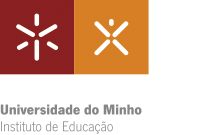The Department of Education Theory and Art and Physical Education
(henceforth designated as ETAPE) develops its activities in various
educational and training contexts and in all stages of learning and
human development. Within the Department there are researchers from
several research centres of the University of Minho: the Research Centre
in Education (CIED), the Child Studies Centre (CIEC) and the Centre for
Humanistic Studies (CEHUM). The Department aims at developing
innovative projects on teaching, research and interaction with society
in emerging areas within its two subject areas, namely:
a) Education Theory – comprising the following object:
1- the reflective and critical reasoning of any field in Educational
Sciences (whether in regard to theory or teaching practices); 2-
historical analysis of facts and educational ideas; 3- educational and
philosophical reflection, and 4- community intervention; 5- educational
animation and personal and social development.
The area of Education Theory refers to the theoretic reasoning of
epistemological, historical, ethical, anthropological, aesthetic,
volitional (etc.) type of any form of lifelong education, which includes
continuous and community education (not only school education) for all
kinds of public and in diverse contexts, such as professional and
recreational contexts, during the exercise of citizenship, etc. It is
therefore a scientific terminology linked to a new educational paradigm
that does not reduce education to its school dimension. It is also this
area's responsibility to construct one (or more) logical systems
consisting of axioms and postulates, as well as of observations that may
help to reason or not scientific hypotheses raised by other areas of
Educational Sciences.
b) Art and Physical Education – comprising the
following object: 1- reflective and critical reasoning on the fields
that characterise the subject area: Art Education (constituted by
Dramatic Expression and Education, by Visual Communication and Plastic
Arts and by Music Education) and Physical Education; 2- the constant
update on research conducted at national and international levels, and
the production and dissemination of knowledge in the three areas of Art
Education and Physical Education; 3- the development of projects on the
interaction with society (and of cultural, artistic and sporting
activities), mobilising the knowledge of Art Education and Physical
Education; 4- the scientific and academic involvement in the evolution
of educational reforms and curriculum changes that are carried out in
various areas of Art Education and Physical Education in Portugal.
Degree cycles in which the DETAPE participates:
A. Undergraduate degrees:
1. Degree in Elementary Education (3 years) at IE.
2. Degree in Education (3 years) at IE (full-time and evening schedules).
3. Degree in Music Education (3 years) at ILCH.
B. Graduate degrees:
Master's degrees of the Department
1. Master's in Teaching Physical Education in Elementary and Secondary Schools (1st and 2nd years)
2. Master's in Education, specialisation in Adult Education and Community Intervention (1st and 2nd years)
3. Master's in Music Education (with the collaboration of ILCH), (1st and 2nd years)
Other Master's degrees
1. Master's in Pre-school Education
2. Master's in Pre-school and Elementary School Education
3. Master's in Elementary and Middle (5th-6th years) School Education
4. Master's in Digital Art and Technology
5. Master's degrees in Teaching
6. Master's in Education, specialisation in Educational Mediation and Supervision in Training.
Doctoral degrees
1. Doctoral Programme in Child Studies in the following areas of specialisation:
1.1. Physical Education, Leisure and Recreation
1.2. Music Education
1.3. Drama Education
1.4. Visual Communication and Plastic Arts
2. Doctoral Programme in Educational Sciences in the following areas of specialisation:
2.1. Philosophy of Education
2.2. History of Education
C. Interdisciplinary areas of specialisation:
1. Adult Education
2. Health Education
3. Socio-cultural and Educational Animation;
4. Research, Pedagogical Supervision and Evaluation Methodologies;
5. Professional and Training Practices.

